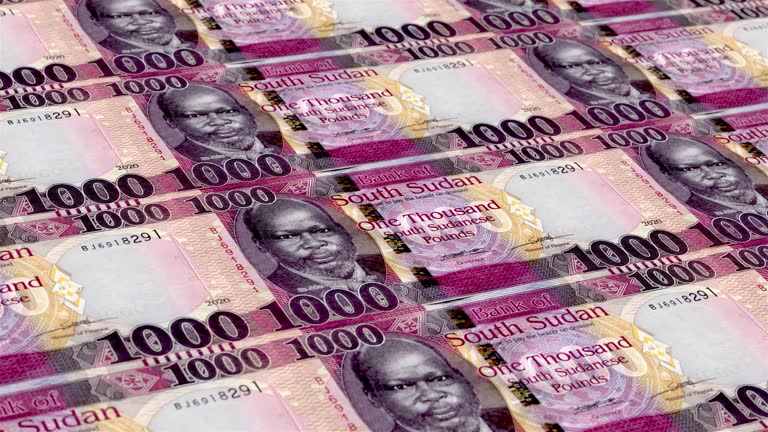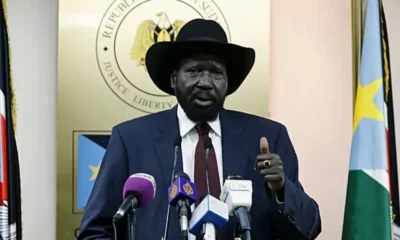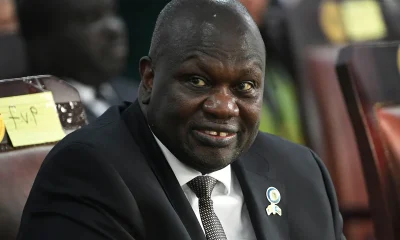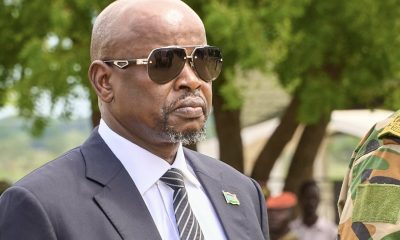Africa
South Sudan Prints More Money to Address Cash Shortages and Pay Civil Servants
Officials warned by mid-2024 that the state could no longer pay salaries for soldiers, police, and civil servants due to the revenue collapse following damage to critical oil infrastructure and ongoing security challenges.

The Bank of South Sudan has announced emergency plans to print additional currency as the world’s youngest nation grapples with a severe liquidity crisis that has left thousands of civil servants without salaries for months.
The drastic monetary measure, revealed by Central Bank Governor Dr. Addis Ababa Othow, underscores the deepening financial turmoil facing a country already battered by years of conflict and economic mismanagement.
Speaking before the Finance and Economic Planning Committee of the Transitional National Legislative Assembly in Juba, Dr. Othow acknowledged that printing money represents a short-term solution to meet what he described as “high demand for liquidity.”
The governor’s candid admission highlights the government’s desperate attempt to address a crisis that has left public sector workers unpaid and undermined confidence in the South Sudanese pound.
The cash shortage has become so acute that the government is unable to pay civil servants due to a cash shortage, according to Finance Minister Dr. Marial, who identified this as a major challenge during recent government proceedings.
This crisis extends beyond mere inconvenience, affecting the livelihoods of thousands of families dependent on government salaries and threatening the basic functioning of state institutions.
The roots of South Sudan’s current predicament trace back to multiple interconnected crises.
Officials warned by mid-2024 that the state could no longer pay salaries for soldiers, police, and civil servants due to the revenue collapse following damage to critical oil infrastructure and ongoing security challenges.
Oil revenues, which form the backbone of South Sudan’s economy, have been severely disrupted, creating a cascade of fiscal problems that have culminated in the current cash crisis.
While the International Monetary Fund recently reached a staff-level agreement with South Sudan on a nine-month monitored program, the fundamental problems persist.
Structural bottlenecks partly hinder the effective distribution of salaries to civil servants due to cash shortages, even as oil revenue is expected to recover substantially in the coming fiscal year.
Dr. Othow emphasized that the central bank recognizes the unsustainable nature of simply printing more money, stating that medium and long-term strategies are being developed to address the crisis more comprehensively.
A special committee, headed by the First Deputy Governor, has been established to explore lasting solutions for cash and currency management, while the bank is simultaneously developing a new National Payment Strategy.
The governor’s remarks on state television revealed the dual approach being taken: “In the short-term plans, we have made it very clear that there is an urgent need for us to print money just to meet the high demand for liquidity. But in the medium and long term, we are looking at how to address the issue of currency management.”
Michael Ayuen, Chairperson of the Finance Committee, confirmed that policymakers are exploring multiple options beyond monetary expansion.
A dedicated committee is researching best practices from both regional and global contexts to develop recommendations that could provide sustainable solutions to the crisis.
The decision to print more money, while providing temporary relief, raises serious concerns about inflation and further weakening of the South Sudanese pound, which has already suffered significant depreciation.
Economic experts warn that monetary expansion without corresponding increases in economic output typically leads to inflationary pressures that can erode purchasing power and worsen the very problems the policy aims to solve.
The timing of this announcement is particularly significant as the economic cluster promised to pay civil servants from the 24th of every month, but it seems not to be working at all, according to recent local media reports.
This failure to meet payment schedules has heightened public frustration and raised questions about the government’s ability to manage its fiscal responsibilities effectively.
South Sudan’s economic challenges are compounded by its heavy reliance on oil exports, which make the country vulnerable to external shocks and infrastructure disruptions.
The recent revenue collapse has exposed the urgent need for economic diversification, though such structural changes require time and resources that the government currently lacks.
The current crisis also highlights broader governance issues that have plagued South Sudan since its independence in 2011.
Previous financial scandals, including corruption in letters of credit programs, have contributed to the depletion of foreign currency reserves and undermined economic stability.
As the central bank prepares to increase money supply, the success of this strategy will largely depend on the parallel implementation of structural reforms and improved governance mechanisms.
The formation of specialized committees and development of a National Payment Strategy suggest recognition that printing money alone cannot solve the underlying economic challenges.
The situation remains fluid, with the government promising additional decisions on the country’s economic direction in the coming weeks.
For now, thousands of civil servants continue to wait for their salaries while policymakers grapple with the difficult balance between providing immediate relief and maintaining long-term economic stability.
The unfolding crisis in South Sudan serves as a stark reminder of the complex challenges facing post-conflict nations as they attempt to build sustainable economic institutions while managing immediate fiscal pressures.
The outcome of the current monetary intervention may well determine the country’s economic trajectory for years to come.
Kenya Insights allows guest blogging, if you want to be published on Kenya’s most authoritative and accurate blog, have an expose, news TIPS, story angles, human interest stories, drop us an email on [email protected] or via Telegram
-

 Grapevine1 week ago
Grapevine1 week agoAlleged Male Lover Claims His Life Is in Danger, Leaks Screenshots and Private Videos Linking SportPesa CEO Ronald Karauri
-

 Lifestyle2 weeks ago
Lifestyle2 weeks agoThe General’s Fall: From Barracks To Bankruptcy As Illness Ravages Karangi’s Memory And Empire
-

 Grapevine4 days ago
Grapevine4 days agoRussian Man’s Secret Sex Recordings Ignite Fury as Questions Mount Over Consent and Easy Pick-Ups in Nairobi
-

 Investigations2 weeks ago
Investigations2 weeks agoEpstein Files: Sultan bin Sulayem Bragged on His Closeness to President Uhuru Then His Firm DP World Controversially Won Port Construction in Kenya, Tanzania
-

 Investigations1 day ago
Investigations1 day agoMulti-Million Dollar Fraud: Three Kenyans Face US Extradition in Massive Cybercrime Conspiracy
-

 Investigations1 week ago
Investigations1 week agoEpstein’s Girlfriend Ghislaine Maxwell Frequently Visited Kenya As Files Reveal Local Secret Links With The Underage Sex Trafficking Ring
-

 News2 weeks ago
News2 weeks agoState Agency Exposes Five Top Names Linked To Poor Building Approvals In Nairobi, Recommends Dismissal After City Hall Probe
-

 Business1 week ago
Business1 week agoM-Gas Pursues Carbon Credit Billions as Koko Networks Wreckage Exposes Market’s Dark Underbelly




























